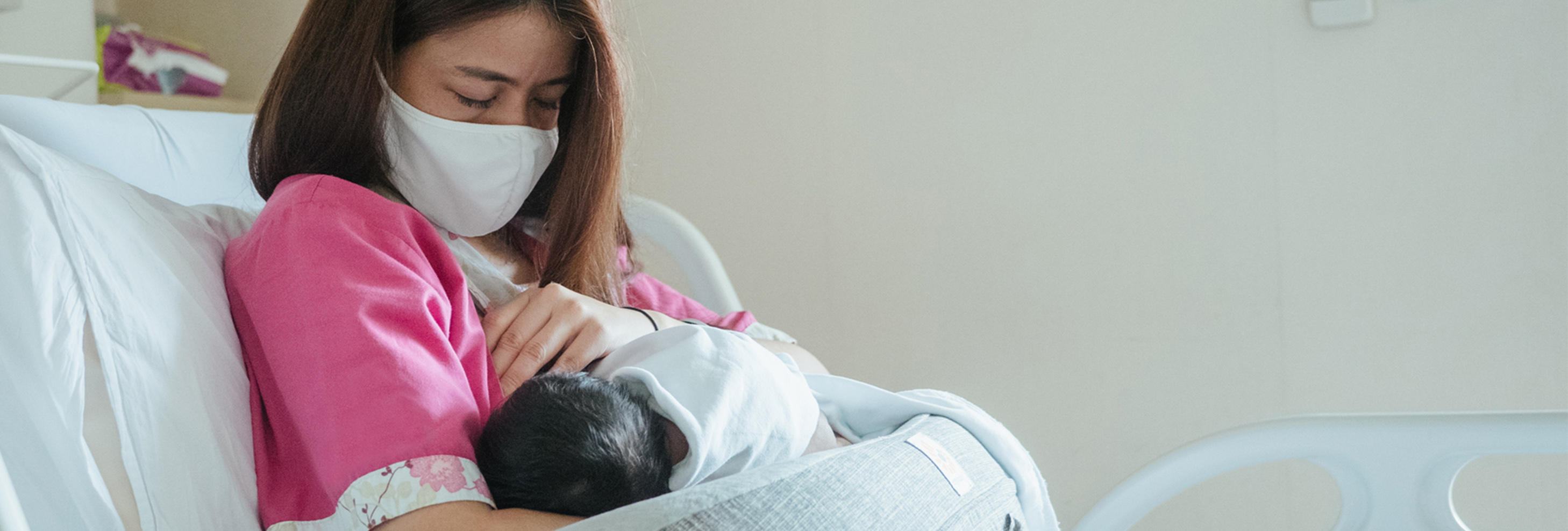Study finds women left frustrated by lack of choice and support but appreciative of staff who went ‘above and beyond’
Women who gave birth during the pandemic are more likely to rate their labour and birth experience positively compared to women who gave birth pre-pandemic, a study has found.
The paper was part of the ASPIRE COVID-19 study, funded by the ESRC and directed by Professor of Midwifery Studies at UCLan Soo Downe. In the paper, published in the scientific journal PLOS ONE, the unexpected finding was the result of a comparison of labour and birth experiences of women in the UK and the Netherlands. The authors believe that the finding may be down to a reduction in expectations of care during the pandemic because of the high level of restrictions and because of the willingness of individual staff to go above and beyond.
However, many women who gave birth during the pandemic also felt let down by a lack of support from the healthcare system as a whole and were left frustrated by the limited freedom they had to make decisions about their labour and birth. In the UK this included a significant reduction in home birth options and access to birthing centres, and restrictions of birth companions.
"... when we looked more closely it became apparent this was because they [women] expected much less from the health care system because of the restrictions placed upon them and were grateful for what would’ve been considered a normal level of support pre-pandemic. "
— Gill Thomson, Professor in Perinatal Health at UCLan, who co-led the study
This sits in contrast to women in the Netherlands who, because of fewer pandemic-related restrictions, felt empowered to make decisions about where they laboured and gave birth.
The paper included information from the international Babies Born Better survey, led by researchers at the University of Central Lancashire (UCLan). It directly compared labour and birth experiences of women in the UK and the Netherlands who gave birth between 2017 and early 2020 and then between the start of the pandemic and December 2020. In total, 2,203 women in the UK and the Netherlands responded to the survey in the later time period. The Babies Born Better (B3) survey, has been running since 2014 and has recorded more than 97,000 responses so far from over 100 countries in more than 30 languages.
Gill Thomson, Professor in Perinatal Health at UCLan, co-led the study. She said: “Although many women in the UK who gave birth during the height of the COVID pandemic reported a positive birth experience, when we looked more closely it became apparent this was because they expected much less from the health care system because of the restrictions placed upon them and were grateful for what would’ve been considered a normal level of support pre-pandemic.
“Women felt they had a lack of freedom to shape their own birth experience and a lack of support before, during and after birth. For some women this was associated with fewer staff being available, by shorter or more distant contacts with staff due to Covid-19 social distancing measures, and their birth partners not being able to present during the birth, or during antenatal appointments.
"However, we repeatedly heard stories of individuals who ‘went the extra mile’ to help, even though restrictions meant it was much harder to provide individualised care. "
— Gill Thomson, Professor in Perinatal Health at UCLan, who co-led the study
“However, we repeatedly heard stories of individuals who ‘went the extra mile’ to help, even though restrictions meant it was much harder to provide individualised care. Many women reported they were particularly grateful for staff who went out of their way to ensure personalised care, sometimes by making exceptions.”
In contrast, the Netherlands took a more community-based approach to maternity care during the height of the pandemic and responses indicate that this choice led to a higher rate of positive birth experiences.
The Netherlands team who worked on the paper was Lauri van den and Ank de Jonge, Professor in Midwifery Science, both from Amsterdam University Medical Center.
Ank de Jonge, said: “Generally, in the Netherlands women were more positive about their birth experience than in the UK. Women with an above average standard of life were even more likely to have a positive experience during Covid than before. One of the things they appreciated was that they could still choose home birth, which was not the case everywhere in the UK.”
"We recommend that personalisation of care remains critically important during a crisis as well as in normal times, and should be part of general policy in maternity care to benefit all service users."
— Professor of Midwifery Studies at UCLan Soo Downe
Professor Soo Downe added: “As we were able to collect responses to the B3 survey at different time points, we could explore how pandemic-related constraints, such as closing birth centres and restricting companionship and visiting practices, influenced women’s experiences.
“We recommend that personalisation of care remains critically important during a crisis as well as in normal times, and should be part of general policy in maternity care to benefit all service users, rather than being maintained for some, and, even then only through the willingness of staff to go ‘above and beyond’.
“The time is now to look forward and prepare more thoroughly for large-scale events that can impact maternity care.”
A full copy of the report, Making maternity and neonatal care personalised in the COVID-19 pandemic: results from the Babies Born Better Survey in the UK and the Netherlands, is available to download from PLOS ONE.
It was funded by the Economic and Social Research Council (ESRC) as part of UK Research and Innovation’s rapid response to COVID-19.

